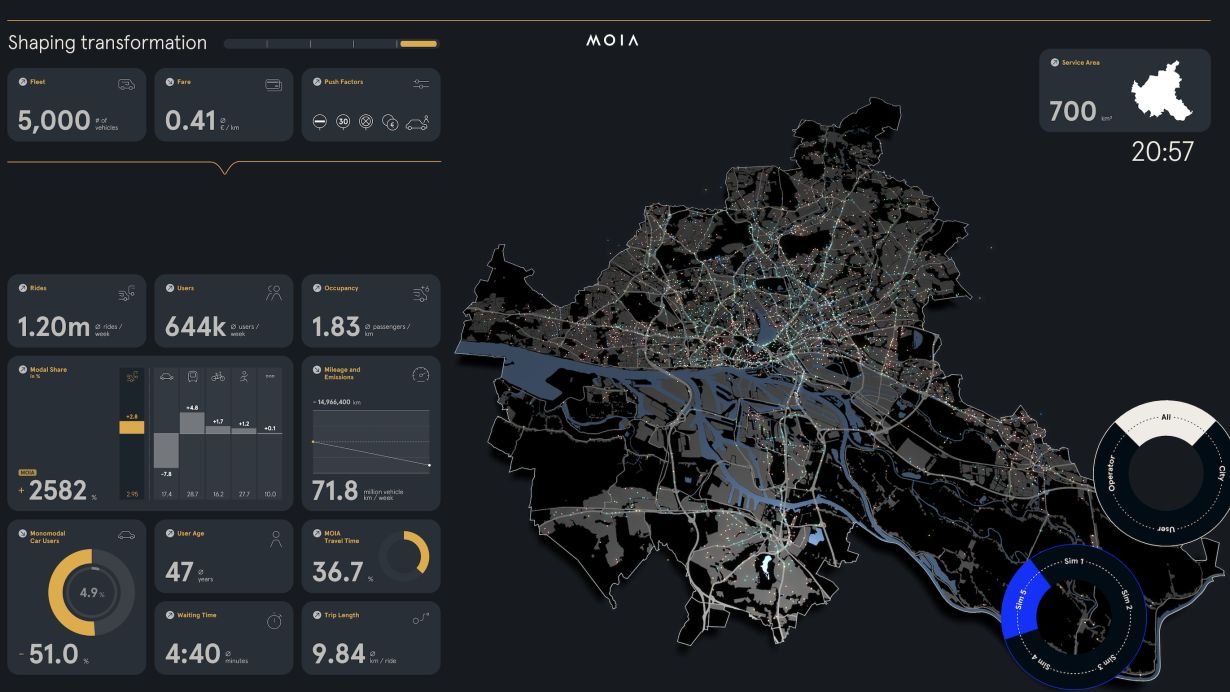
Transport offers on demand benefit the mobility transition. This was found by researchers of Karlsruhe Institute of Technology (KIT) in an extensive transport simulation. For two years, they studied the effects of Europe's biggest electric rideshare service operated by MOIA on the traffic situation in Hamburg. The study with a specially developed simulation tool for the first time provides scientifically independent findings for MOIA, transport policy, and transport planning. And it confirms that ridesharing can help reduce car traffic in the city. This effect is increased when it is less attractive to use the own car in the city.
"Our simulations based on surveys and many other data reveal that mobility transition will be possible when attractive alternatives to the private car are provided and stricter regulations for motorized individual transport will be adopted," says Dr. Martin Kagerbauer from KIT's Institute for Transport Studies (IfV). "Our study provides major indications as to which elements are needed to push the mobility transition."
Together with the Technical University of Munich, Kagerbauer and his team studied the impacts of ridesharing services offered by MOIA on the transport system in Germany's second largest city Hamburg for a period of two years. MOIA is a company of the Volkswagen Group and offers ridesharing services to close the gap between taxis and public passenger transport. An algorithm ensures that users having similar destinations are transported together in the same vehicle. Transportation takes place independently of a timetable or a fixed route. On the way, passengers can get on and off flexibly. Whoever likes a lift can order the vehicle via an app on his or her mobile phone. Then, an algorithm plans and optimizes the route. "Having completed our study, we can now understand the behavior of people sharing rides much better and, hence, will be able to open up the potentials of such services more specifically in future," Nadine Kostorz, IfV, says.
Ridesharing Benefits Public Passenger Transport
Concerns that ridesharing would cause public passenger transport in Hamburg to lose passengers were not confirmed, the experts say. On the contrary: "When new transport means are added, routes will be shifted from existing transport means to the new ones offered, but the so-called tour effect and better accessibility of stops cause public passenger transport to profit from ridesharing," says Gabriel Wilkes, IfV. "When going to the cinema, for instance, persons frequently cover only one way by ridesharing. For the other way, public passenger transport is used," Wilkes explains the tour effect. Altogether, effects on public passenger transport are positive.
A simulation of a scenario with full availability of autonomous ridesharing services with many vehicles, well-developed public passenger transport systems, and simultaneous restrictions of car traffic revealed that car traffic in Hamburg might be reduced by eight percent. "Vehicle kilometers would decrease by about 15 million per week, which is remarkable. This would make mobility in Hamburg far more sustainable and greener," Kagerbauer says.
Transport simulation with the mobiTopp software tool developed by KIT is unique. "The tool models mobility of the population of Hamburg and of all persons traveling there for a period of one week. We model precisely to the minute and with high spatial resolution all routes to all activities, such as work, shopping or leisure activities," Kagerbauer explains. "The new thing is that our tool does not only consider conventional transport means, but also new types of mobility, such as ridesharing and car, bike, or e-scooter sharing."






